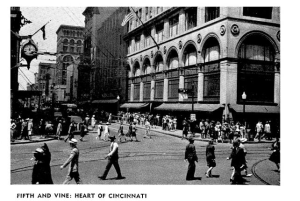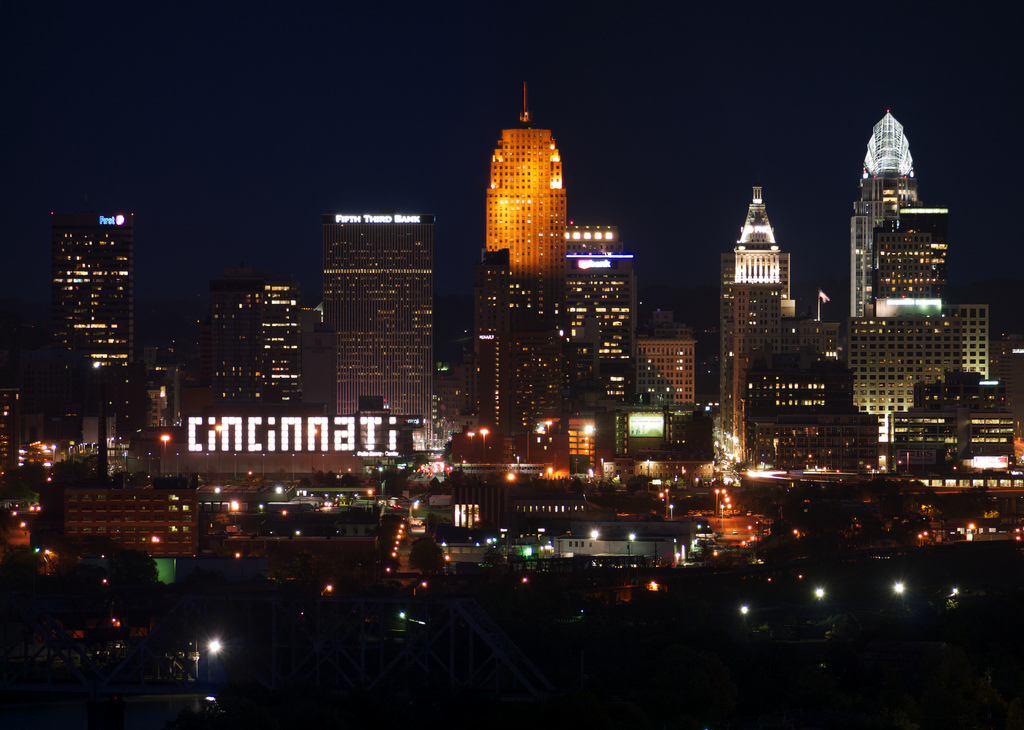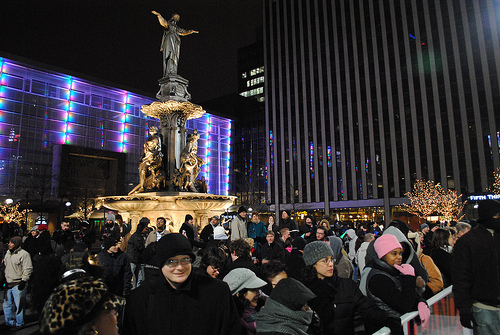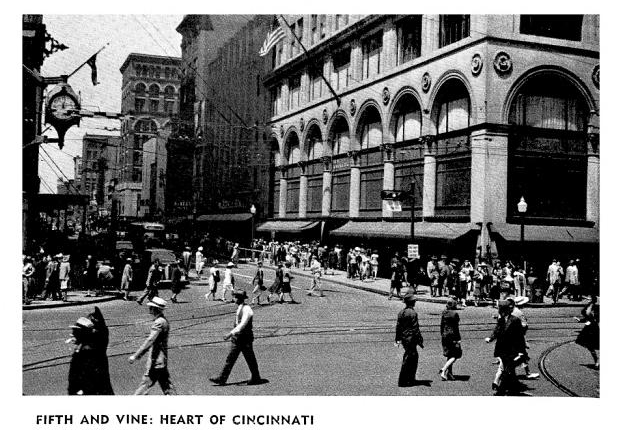 Max Grinnell is an author, historian, and a professor who is experienced at sharing unique perspectives of American cities. He has given a number of talks and led walking tours in cities across the country, focused on urban innovation, public art, and travel. Next week, he will be coming to Cincinnati to give us a look at the city from a historical perspective.
Max Grinnell is an author, historian, and a professor who is experienced at sharing unique perspectives of American cities. He has given a number of talks and led walking tours in cities across the country, focused on urban innovation, public art, and travel. Next week, he will be coming to Cincinnati to give us a look at the city from a historical perspective.
Grinnell’s tour will be based on Cincinnati: A Guide to the Queen City and Its Neighbors, a book published in 1943 for the Federal Writers’ Project. It is a part of the American Guide Series, also known as the WPA guides, a program funded by the New Deal to employ writers during the Great Depression. Today, it serves as a snapshot of 1943 Cincinnati, when the city’s population was 455,610 and now-iconic structures like Carew Tower and Union Terminal were just a decade old.
UrbanCincy was able to ask Grinnell a few questions about why he was inspired to come to Cincinnati for this event.
UC: You’ve given walking tours of many other cities, and have upcoming tours scheduled for Chicago and Boston. What drew you to Cincinnati, a comparatively smaller city, for a tour?
MG: I started coming to Cincinnati five years ago to work as a grader for the AP Human Geography exam. I’ll be honest: I didn’t know much about Cincy before I got here. Probably thought about chili, Pete Rose, and that’s about it. Now? I’m a totally Queen City booster: I tell people about Mount Adams, the streetcar, the walkable neighborhoods, the great food scene, the alleys (yes, the alleys), and more.
UC: What inspired you to create a tour centered around the 1943 WPA Guide to Cincinnati?
 MG: Taken as a whole, the Federal Writers Guides are nothing short of amazing. Imagine the government putting writers back to work in the Great Depression by writing about their cities, states, regions, and more. Truly a fantastic undertaking, and the Cincinnati guidebook was the last big one to be released.
MG: Taken as a whole, the Federal Writers Guides are nothing short of amazing. Imagine the government putting writers back to work in the Great Depression by writing about their cities, states, regions, and more. Truly a fantastic undertaking, and the Cincinnati guidebook was the last big one to be released.
The guidebook cover all of Cincinnati, plus northern Kentucky, the far reaches of Hamilton County and more with an eye for spectacular details. Historic homes, obscure technical schools, evocative park descriptions, and just about anything else was grist for the mill. Today, travel guides don’t get into that type of detail, which is a same.
Also, it’s a bit of an “amber” moment, if you will, as this was the Queen City at its industrial peak. I consider it one of the better city guides produced by the Federal Writers project and that’s significant, considering other volumes considered New Orleans, Philadelphia, and others.
UC: For people who have been following the many changes in Cincinnati’s urban core in recent years, what new perspectives might they gain from the tour?
MG: I think they’ll gain a new perspective courtesy of the past, if you will. We’ll be hearing about how businesses like the Netherland Plaza Hotel, the Billboard Publishing Plant, the James Book Store and more gave the downtown character. As someone who teaches urban studies for a living, I think we’ll also be talking about how the various buildings have been repurposed over time and how various civic leaders have seen visions both realized and unrealized come and go.
Tours will be given on two dates–Thursday, June 4th and Saturday, June 6th–at 6 p.m each day. The tour lasts 60 minutes, and tickets can be purchased for $15 at Grinnell’s website.
 The walking tours are inspired by Cincinnati: A Guide to the Queen City and Its Neighbors, a book published in 1943 for the Federal Writers’ Project. This book was a part of the American Guide Series, also known as the WPA guides, which was a program funded by the New Deal to employ writers during the Great Depression. Today, the book serves as a snapshot of 1943 Cincinnati, when the city’s population was 455,610 and now-iconic structures like Carew Tower and Union Terminal were just a decade old.
The walking tours are inspired by Cincinnati: A Guide to the Queen City and Its Neighbors, a book published in 1943 for the Federal Writers’ Project. This book was a part of the American Guide Series, also known as the WPA guides, which was a program funded by the New Deal to employ writers during the Great Depression. Today, the book serves as a snapshot of 1943 Cincinnati, when the city’s population was 455,610 and now-iconic structures like Carew Tower and Union Terminal were just a decade old.



 Max Grinnell is an author, historian, and a professor who is experienced at sharing unique perspectives of American cities. He has given a number of talks and led walking tours in cities across the country, focused on urban innovation, public art, and travel. Next week, he will be coming to Cincinnati to give us a look at the city from a historical perspective.
Max Grinnell is an author, historian, and a professor who is experienced at sharing unique perspectives of American cities. He has given a number of talks and led walking tours in cities across the country, focused on urban innovation, public art, and travel. Next week, he will be coming to Cincinnati to give us a look at the city from a historical perspective. MG: Taken as a whole, the Federal Writers Guides are nothing short of amazing. Imagine the government putting writers back to work in the Great Depression by writing about their cities, states, regions, and more. Truly a fantastic undertaking, and the Cincinnati guidebook was the last big one to be released.
MG: Taken as a whole, the Federal Writers Guides are nothing short of amazing. Imagine the government putting writers back to work in the Great Depression by writing about their cities, states, regions, and more. Truly a fantastic undertaking, and the Cincinnati guidebook was the last big one to be released.